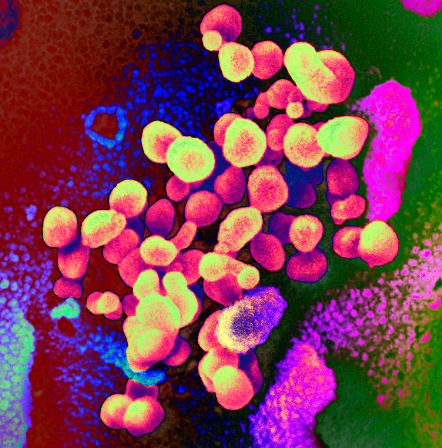'Mu' strain in vaccine claim
 The COVID-19 ‘Mu’ variant is on the rise, leading some to ask whether the world’s response will change.
The COVID-19 ‘Mu’ variant is on the rise, leading some to ask whether the world’s response will change.
The COVID-19 Mu variant has spread to 42 countries, even though early studies suggest that it is less easily transmitted than the Delta variant, which has triggered a resurgence of the pandemic in many countries.
The World Health Organization (WHO) has used Greek letters to denote 12 different COVID-19 mutations so far, five of which (including Mu) have been classed ‘Variants of Interest’.
The next step up in the WHO system is ‘Variant of Concern’, and Mu has not been upgraded yet.
Mu appears to have eight mutations in its spike protein, many of which are also present in variants of concern: Alpha, Beta, Gamma, and Delta.
Concerningly, some of Mu’s mutations help other variants evade antibodies from mRNA vaccines. It also harbours some novel mutations that have not been seen in other variants, so their consequences are not fully understood.
There is a growing amount of pre-print and early research emerging on various aspects of this and other strains.
A recent study from a lab in Rome showed that the Pfizer/BioNTech vaccine was less effective against Mu compared to other variants when tested in a lab-based experiment. Despite this, the study still considered the protection offered against Mu by the vaccine to be robust.
Dr Vinod Balasubramaniam - a virologist at the Jeffrey Cheah School of Medicine & Health Sciences at Monash University, Malaysia - says that while the scientific world rushes to find out more, the plan to combat COVID-19 remains largely the same, though it is becoming more urgent.
“Every time the virus reproduces inside someone there’s a chance of it mutating and a new variant emerging,” he says.
“This is a numbers game. It’s a random process, a bit like rolling dice. The more you roll, the greater the chance of new variants appearing.
“The main way to stop variants is global vaccination.
“The emergence of Mu reminds us of how important that goal remains. We must get vaccines to these people as quickly as possible, both to help the people there who are vulnerable but also to stop new variants from emerging. Otherwise, our exit from the pandemic will be set back.
“The only way is to sprint towards the finish line to have any protection against these emerging variants.
“In the case of the Mu variant, as explained before, it contains the recipe for disaster as an initial look at the viral genome suggests the possibility of immune evading capabilities similar to other variants of concern.
“As scientists globally are looking in-depth at its pathogenicity, virulence and transmission, we will only get a clearer picture in the coming months. But countries cannot rest on their laurels and risk another variant wreaking havoc similarly to the current situation with the Delta variant.
“We must stay vigilant and tighten control, testing at our borders, and monitoring this development closely.”







 Print
Print